#zillenial
Text
Millennials this, Gen Z that. But where is my fellow Zillennials at? Those of us who at the start of our lives didn't have cell phones. We had house phones. Well our parents may have had a cell phone but it was the Nokia phone that had the snake game. Those of us who actually had to go outside and play because we didn't have ipads. Those of us who may or may not have had a computer but it was a family computer, one the whole family shared. Those of us who started to learn what an atlas was because teachers thought we'd need to use them but never actually needed to use one. Those of us who learned what an encyclopedias was and actually used them up until late middle school when we finally got to google stuff. Where are you?
106 notes
·
View notes
Text
Generations aren’t about age or birth year.
Generations are about how you make hearts with your hands.
27 notes
·
View notes
Text
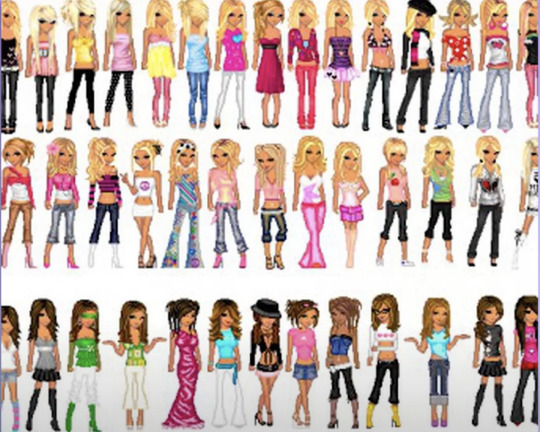
The INSTANT nostalgia I was slammed with when I saw these pixel dolls!!!
#I USED TO PLAY WITH THESE THINGS ALL THE TIME ON OUR OLD-ASS COMPUTER#pixel doll#pixel art#nostalgia#zillenial
28 notes
·
View notes
Text
Hot take: Taylor Swift and Zillenials have an unbreakable trauma bond.
#taylor swift#speak now#zillenial#millenials#gen z#swifties#taylor swift eras#fearless#taylors version#not queen
66 notes
·
View notes
Text






Blossom Icons
164 notes
·
View notes
Text
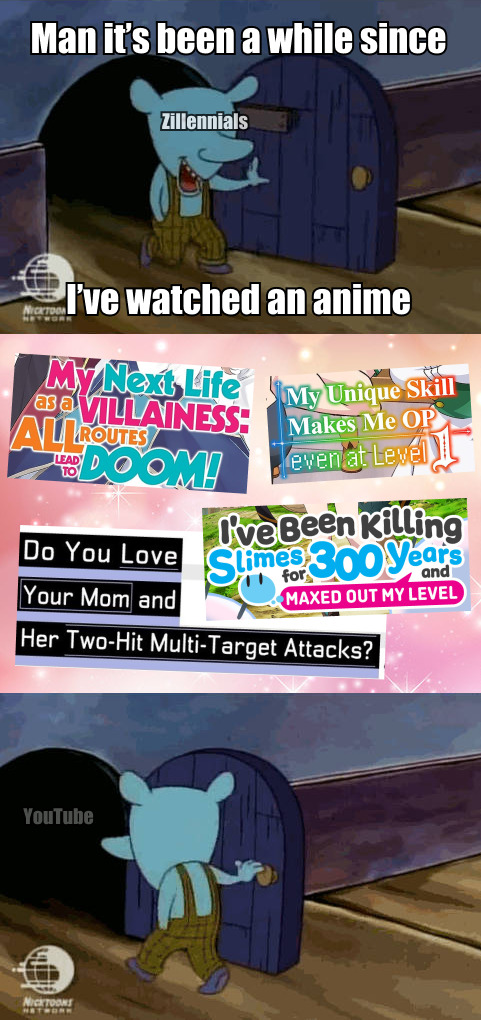
#anime#zillenial#millennials#manga#i've been killing slimes for 300 years and maxed out my level#do you love your mom and her two-hit multi-target attacks?#my next life as a villainess#my next life as a villianess all routes lead to doom#my unique skill makes me op even at level 1#isekai#meme#WHY THEY NAMES SO LONG#dumb names#anime with dumb names
49 notes
·
View notes
Text
“tiny home culture”, “van culture” isn’t cute it’s fucking tragic. no i don’t want to live in a fucking shed. thanks but i already lived in a fucking vehicle. MAKE ACTUAL HOMES AFFORDABLE AGAIN. social media is trying to glorify *PAYING* for what is essentially homelessness. NO. STOP IT.
#homeless#homelessness#tiny home#tiny house#van life#van living#glorified homelessness#reprogramming#make homes affordable#tf#gen z problems#millenial problems#zillenial#housing#housing market#personal rant
12 notes
·
View notes
Text
Imma let y'all in on a stroke of millennial parenting genius that probably won't work today, but I recognize as supremely impressive in hindsight.
If you don't know/remember, Webkinz is/was a brand of plushies that you could buy at the Hallmark store and register online to take care of and play computer games with. They were kind of like a superior competitor to Neopets. If you had a Webkinz account, you had to buy and register a new Webkinz plushie every year or so to keep your account active.
When I was a kid, I had a friend who was really into Webkinz. Like, she had a bed worth of surface area devoted to excess Webkinz that were unregistered so she could renew her account on a moment's notice. I don't know where she got them-- could have been from family and friends as gifts, could have been all she spent her allowance on. Point is, she spent a lot of time playing computer games, and when I went over to her house, that was most of what we bonded over.
Her dad was also kinda technologically savvy-- I think it was part of his job. I don't even think this was that hard to do at the time, but he had the TV set up to act as the monitor for their family's desktop computer. Like, it was a huge TV, so their family computer basically had a comically large monitor.
We thought this was the coolest thing ever, and the most "secretive" thing we ever did on the computer at that age was type in our Webkinz password. We didn't think anything of the fact that her parents could sit behind us on the couch, or see the TV from the kitchen, and monitor what we were doing online as though they were sitting on a bench at the playground.
We got to obliviously live our rich-kid-magic-tech dreams and play our computer games, and they got peace of mind knowing that we weren't being exposed to porn or animal torture while on the internet.
I so hope that this will work on gen-alpha kids by the time I have them because it is not the internet's job to be kid-friendly. It's its job to be organized with kid-friendly spaces, but I think being able to monitor kids' play during screen time the way you monitor them during outdoor play is a no-brainer.
21 notes
·
View notes
Text
I'm a Zillenial, what the hell is cringy now.
#add your gen#if youre brave#i dare you#i double dare you#explain yourself#better yet#Just help me#please#zillenial#millenial#genz#gen z culture#gen z humor#millenials#polls
17 notes
·
View notes
Text

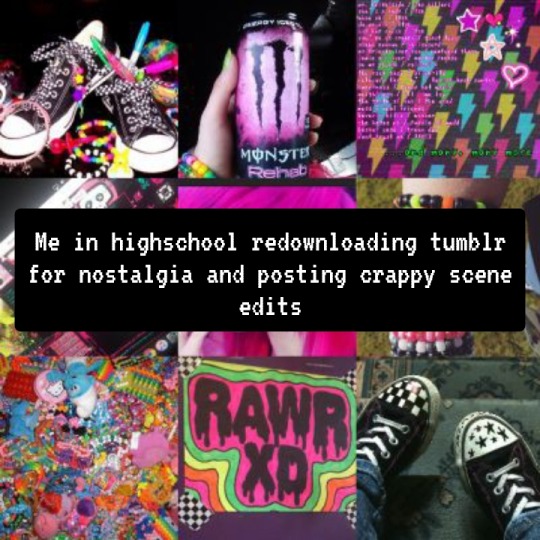
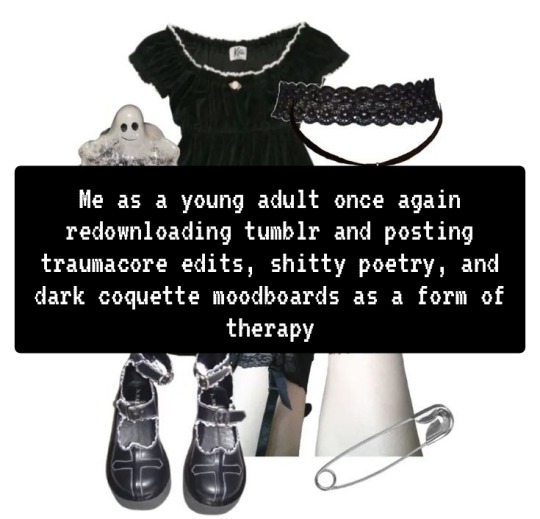
Tumblr and notes app will always be by my side
#old tumblr#2014 tumblr#2014 revival#2014 grunge#tumblrina#tumblr girlies#just girly things#just girly thoughts#elder emo#zillenial#scenecore#scemo#alternative#coquette aesthetic#dark coquette#hell is a teenage girl#inner thoughts#pastel goth#pastel grunge#im just a girl#girlhood#just girly posts#gaslight gatekeep girlboss#nostaligiacore#looking back#aesthetic#sad gurl#sadgirl#2015 tumblr#2015 aesthetic
6 notes
·
View notes
Text
must be 'live
and I'm breathing
lost in time
i'm fine
8 notes
·
View notes
Text
I feel like I had to grow up quite quickly when I was a teenager and it was A Lot so now that I'm nearly 30 I feel really young because I kinda missed out on a lot during my late teens so now I'm almost, like, reliving my youth? But as an adult? Idk if this even makes sense.
4 notes
·
View notes
Text
...
#reblog#reblog for a bigger sample size#besties#e begging#bullying#poll#tumblr polls#polls#emoji#zoomers#zillenial#delulu#meme#tumblrina#tumblrcore#we live in a society
5 notes
·
View notes
Text
The Internet is a weird place. You open it up, and it's like "Gen Z: most empathetic generation?" "Gen Z: makes cruel jokes and hates everyone."
Like. Which is it??? I need to know, so I can go completely change my personality to fit other people's expectations!!
Anyway, if you need me, I'll be starting a revolution.
#gen z humor#gen z stuff#lol#maybe we should be called the generation of coping mechanisms who just wants the planet not to die#zillenial
2 notes
·
View notes
Text
hey I think I know why old people are insincere assholes the essay
Yknow when you're trying to connect to someone from an older generation, and they gloss over your attempts at genuine connection?
Like when a family member got you a gift that really meant something to you, but when you try to express your genuine gratitude, it seems like they don't really give a shit?
Or maybe you open up and share something personal with an older coworker or family friend along with some advice on a concern that you've been actively worrying about for them, but they don't acknowledge it or even act like they heard you at all?
Something clicked for me today, and now I think it's bigger than Poppop's Just An Asshole Sometimes.
I think there's been a huge shift in western culture around authenticity and genuine expression in the past two decades or so - the way we as a society and culture view it, express it, present it, and respond to it - that's causing minor intergenerational conflicts in our personal lives, but more importantly, major conflicts in our shared public spaces.
Hear me out.
1. Authenticity Then VS Now
2. Authenticity Becomes A Privilege And No One Tells The Boomers
3. Boomer-Meta and Why It Matters
1. Authenticity Then Vs Now
If you're on tumblr you probably understand nuance -
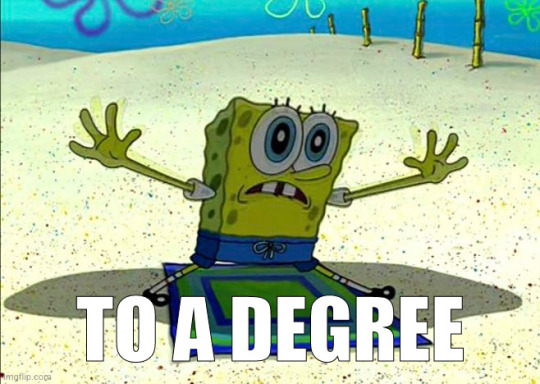
- so I think the concept of "authenticity" meaning something different to Boomers than it does to Millennials or Gen Z isn't baffling to you. it probably feels really familiar.
If you went to a US school in the 2000's, you probably remember the DARE program and anti-smoking and anti-drug ads on TV. And if you don't, you probably already have an idea of what I'm talking about. Things made by adults that felt embarrassingly out of touch to the children they were designed for.
As we all know, these all flopped immediately yet lasted the whole decade. (flopped except for the anti-smoking ads which I'll come back to) In retrospect, these marketing attempts says a lot more about the generation of adults responsible for them.
Things like the DARE program were, pretty transparently, designed to resemble what boomers remembered was "cool and interesting" from their own childhoods. My favorite example is Yello Dino and his video on "Tricky People" that's a painfully obvious homage to Fonzie from Happy Days crossed with Barney that's just as painful to watch.
youtube
Watch from 8:03-15:30 or so to see Yello Dino appear and sing a stranger danger song with the Local Kids™.
It's easy to look at this kind of thing and the DARE program and say "of course kids didn't fall for any of this, it's so poorly made; blatantly trying to sell an idea;" etc. But I think the core issue is authenticity.
Remember the anti-smoking ads? Those worked in the end because they featured people who looked like people we knew in person, with real problems from actions they really regretted. And that stuck.
But the Boomer "How Do You Do Fellow Kids" bullshit was never grounded in reality.
The approach they were trying to replicate only worked back in the boomers childhoods because everyone was seen as being genuine by default.
People in real life told the truth unless proven otherwise. Comedians on TV said things to make the audience present laugh. Singers appeared on TV so you could see them as well as hear them. People in ads were selling you a product.
Actors acted like their characters to portray that character "genuinely".
Why would they lie? Their job is to be that character. If they say they like Big Coffee Brand™, you might laugh as it's obviously an ad,
but you also then believed that to be true.
No, really. The section on Fonzie's wiki page bout Henry Winkler's involvement in social issues, titled "Civic Involvement," reads like a social commentary in a dystopian horror. There's little to no distinction between the character and the actor. Henry Winkler is Fonzie, and Fonzie is Henry Winkler.
So if you wanna be like Fonzie, you wanna be like Henry Winkler. You wanna smoke and drink and say what Henry Winkler does, because that's what Fonzie does.
Do you see where I'm going with this?
Now, flash forward to the 2000's.
The police officers doing DARE were (mostly) never thrilled to be there. The anti-weed ads were so exaggerated that they seemed cartoony. Hell, some of them were cartoons, just unfunny ones. And most importantly, we were taught from a very young age that everyone is always lying.
"Never reveal personal information about yourself to strangers or online to protect yourself" turns into "Everyone is lying to you to get something from you" really, really fast.
People in real life aren't to be believed until they can prove what they say is true. Comedians on TV say things to keep themselves relevant and in the rumor mill. Singers appear on TV to sell concert tickets and promote albums. Ads use social issues that affect real people as marketing. Actors are people who are pretty and pretend to be other people in a way that's never convincing, but sometimes if they're feeling generous they'll let you know what they really think and feel.
So, why would anyone tell the truth?
Why should you?
2) Authenticity Becomes A Privilege And No One Tells Boomers
(Thank you for reading this far and I promise I'm don't with the edgy "everything sucks" poetry now)
So now we've all grown up into jaded adults who've been taught to not trust but to strive to "be your unique self" and that creates some weird social dichotomies.
If you want to be truly happy, you must accept yourself and do what you want to do.
....but then you risk being seen as a cringey fuck that gets laughed at on Facebook by your highschool classmates and all of your previous bosses.
All jokes aside, modern society prioritizes a readied public face now more than ever, and that's really exemplified in the Internet celebrity experience. Taking a mild stance on anything generates tabloids attention, and doing something the public frowns upon can ruin a person's career permanently. you're on tumblr, this isn't news to you. you get what I mean.
This consequently makes moments of genuine emotion and expression from these celebrities inherently risky - and thus, a much more rare occurrence. Moments of streamers getting scared by spiders or cockroaches blow up constantly because, I mean yeah sure it's funny, but it's also really REALLY difficult to stage a believable reaction to something like that. And that carnal reaction draws out the desire for connection in all of us. That moment of unfiltered response feels special - a brief glimpse behind the curtain.
And celebrities online know it too. Apology videos, let's plays, streaming - all of this media has a built in sense of authenticity that is vital to making it work. Authenticity is a premium social currency in this space, and that bleeds into our everyday lives as well.
If the most badass and brave thing your idols can do is to be sincere, then eventually, you'll probably feel that way too. It makes sense - sincerity is vulnerable. Choosing to be deliberately honest and emotional when you have no expectation to be is a powerful thing. At least, to most of us it is.
While this is all happening, there's an entire generation of people who are still experiencing the world like when happy days was airing.
Dr. Oz, Dr. Phil, Rachel Ray.......whatever other bullshit they put on TV, all of it begins to make more sense when you focus on their target audience - the middle aged and elderly.
Yes, really. Think of who you know in real life who absolutely loved The Big Bang Theory.

I mean, come on. This image makes me sad, dude.
Humor me for a moment. let's just run with my theory and say middle-aged and older people are all walking around as if everyone is always telling the truth to them.
Is it really that surprising that Dr. Oz was/is?? as successful as he was? As it turns out, believing everything to be true until proven otherwise is incredibly dangerous when applied to medical practice!
While we were growing up, the middle aged and elderly were spending their time being constantly self-absorbed and, just, unapologetically themselves. Which doesn't sound bad in theory, but it's really not as straightforward as it sounds.
3. Boomer-Meta And Why It Matters
So boomers are gullible. the sky is blue. why should you care
The point to all this is that authenticity is very important to modern society, and the difference of what authenticity means and how it's expressed matter drastically when understanding each other is vital.
Boomers were raised to always be genuine. If one believes themself to always be truthful, that lends to forming a bias in their own favor. And breaking the mentality down further, "I always say what I mean and I mean what I say" implies that what was said is what is true. And further, someone changing their "story" is an indicator of deception.
I've met plenty of older generation people who act like sharing their opinion is a gift in and of itself i.e. unwarranted comments on cooking or food, interjected advice about the conversation subject. Similarly, questions about the validity of a statement seem to often be taken as questioning ones morals.
This personal bias is very apparent in interpersonal situations. An attempt to be more genuine with someone who thinks this way would come across as staged and more insincere, and conversely, speaking with a clear bias appears superficial and ignorant.
But the real conflict is how this affects our news and politics. A core misunderstanding of what sincerity is and what it looks like, from either side, is dooms any conversation before it ever begins.
The lack of literacy in each other's values adds so much unnecessary conflict into already divisive matters. The stagnation in the legal progress of important social issues is probably worsened with so many of the US lawmakers being elderly themselves.
I don't have a great way to end this thing, but thanks for reading my weird essay.
The slow realization that a misunderstanding could be at the center of most major political conflict in the US consumed me for like 12 hours today and I appreciate you taking time to read my ramblings.
#i wrote a fucking essay and for what#ugh#i hope this was worth...anything to someone#i have NO idea how to tag this bro#long#generational conflict#baby boomers#millennials#gen z#zillenial#idk#Youtube
5 notes
·
View notes
Text
Ello Creation System - A Deep Dive

While scrolling on Youtube I found myself remembering about the Ello Creation System, and after trying to look for pictures of the sets I used to have I found myself getting into a hyperfixation hole about the whole thing.
I'm not so sure how obscure or unknown they are, but after a while I was able to uncover a bit of history about them, and I want to share that with the world.

(Ello-Opolis: People, Places and Things set)
In the late 90's to early 2000;s, Ivy Ross was the head of Mattel's creative division, being in charge of "Project Platypus", a team developing a new set of building toys aimed for preteen girls. In that team was Richard Manville, who developed the concept and idea for the toy, from the branding and packaging to the look of the pieces. After Bratz launched, Ivy Ross left Mattel and a couple of months after Ello Creation System was discontinued.
One thing that I find interesting is how the Wikipedia page says it was discontinued in 2004, while in Mattel's own website it states some of the toys were released in 2005. Also, not all of the sets are listed on Mattel's website, such as Ello-Opolis Cats and Dogs, and On The Go Snow (which even has an Amazon listing), and there's even some that I haven't found any pictures of besides the ones on the Mattel website like the watch and the scooter.
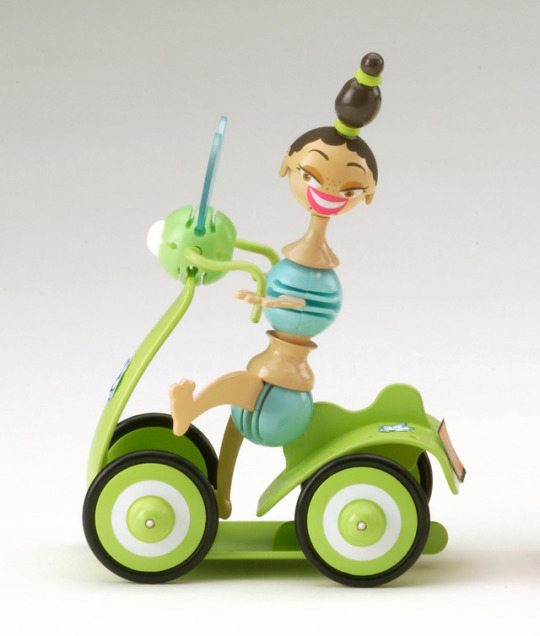
(High Res image of the scooter set from @richardmanville . No other pictures currently exist on the internet (that I know of).

(This is the only picture of the watch on the whole internet, I'd absolutely love to own one, but I think I'd be okay with just a high-res picture. Was it ever released?)
A very interesting thing I'd like to share is what I've found on the United States Patent and Trademark Office website, which mentions the name Ello Creation System and its logo were registered under Mattel until 2011, for its use in items such as toys, educational games, clothing and shoes, bed spreads, lunch boxes, cutlery, hair combs, toothbrushes, backpacks, stationary, lamps, shampoo, and even bandages, they sure wanted to be covered in case the name went big.
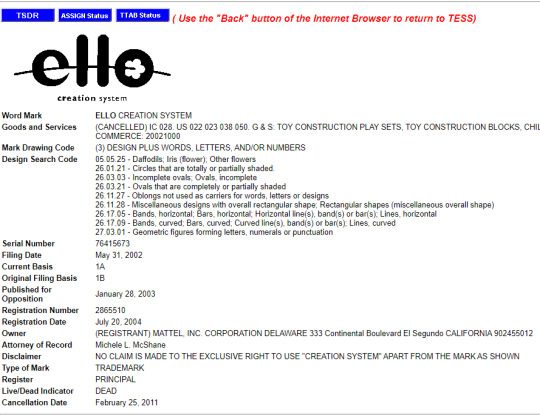
(One of the Ello trademarks on the USPTO website)
In that same search I found out that after their trademark ran out, in 2013 LeapFrog grabbed the name "ello" for a brand of water bottles, which was one of the intended uses Mattel had for the line.
The reason for the discontinuation is still unknown, but since Manville is still present in social media maybe he could bring some light into it. Since I'm not any type of notorious journalist, documentary YouTuber or any of the sorts I don't think I've got the qualifications to bother him about an obscure project he ran 20 years ago, but maybe one of you does, in which case I'd love to hear about it to get the end of the mystery, my ASD brain would absolutely appreciate that!!
Let me know if any of you knew about this, or if you've got any other info you'd like to share about the toys! Whether it be your stories about playing with them or if you know any bits or pieces missing!
#ello creation system#ello#mattel#2000s toys#early 2000s#millenial#zillenial#toys#y2k#construction toys#girl toys#discontinued toys#long post#text post#original#this is what happens when you hyperfocus#asd#actuallyautistic#neurodivergent#obscure toys#nostalgia#00s nostalgia#deep dive#toy industry#richard manville#ivy ross
10 notes
·
View notes